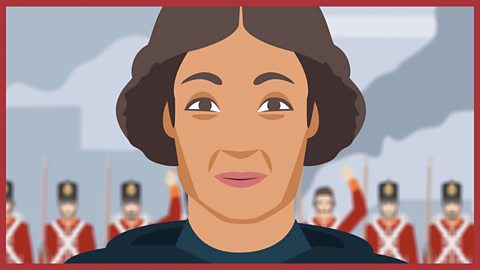In short...
Rosa Parks (1913 - 2005); Black History Month; Civil Rights; justice and equality.
Summary: On 1 December 1955 Rosa Parks refused to give up her seat on a bus to a white passenger, contravening local laws. Parks' actions made her a figurehead of the Civil Rights movement and an inspiration to those fighting for justice and equality.
Resources: . This assembly uses a slideshow and a video clip (below). Pause the slideshow after Image 6 to play the video clip.

The video
ROSA PARKS:
It was December 1st 1955.
I don't know why it happened on this day. It was a day like any other.
It had been a long day at work and I was eager to get home, take off my shoes and rub my feet.
It was a day like any other. I didn't know when I boarded the bus that afternoon that I was gonna do what I did.
I took my seat in the row behind the white people seats. The white rows were full when another lady boarded the bus. I stayedput.
I felt myself rooted to the spot just like a tree. Somehow, in that moment I'd made up my mind.
The white people in front of me tutted and shook their heads. I felt the black people behind me sit up a little straighter, keen tosee what would happen next.
The bus driver left his seat. But still I didn't budge.
Somehow, I'd made up my mind. The white people in front of me tutted and shook their heads. I felt the black people behind melean forward to see who it was that had dared to disobey the rules.
The police came, but still I didn't budge. I'd never made a fuss before. I'd never broken any rule let alone be arrested, butsomehow I'd made up my mind.
People said afterwards that I refused to give up my seat because I was tired.
True. It had been a long day and my body ached.
But that's not why I refused to stand. No.
The only tired I was, was tired of giving in.
Tired of being treated differently like a second class citizen on account of the colour of my skin. Everyone else, I knew was tiredof it too.
And it was just, we didn't know what to do about it.
The video clip is a dramatisation of Rosa Parks' bus journey on 1 December 1955 in the town of Montgomery, Alabama. Parks was making her usual journey returning home from work when she was asked to give up her seat in the section of the bus reserved for black passengers by a white passenger who had boarded and could not find space in the section reserved for whites. Parks refused to give up her seat and was later arrested and charged.
Parks recalled in her autobiography that it had been said she refused to get up 'because she was tired' but that in reality the only tiredness she had felt was being 'tired of giving in'. The dramatisation ends at the moment of her arrest.
Duration: 3' 19"
End of speech: '…we didn't know what to do about it.'
Video questions
- What was the date of Rosa Parks' actions? (1st December 1955)
- Where was Rosa Parks travelling? (She was returning home after work)
- Where did Rosa Parks sit on the bus? (In the seats at the back allocated to black people)
- What happened after Rosa Parks refused to give up her seat? (The driver asked her to move; then the police arrived and arrested her)
- What does Rosa Parks say she was 'tired of'? (She says she was tired of 'giving in')

Key links
Download / print the framework ready for use
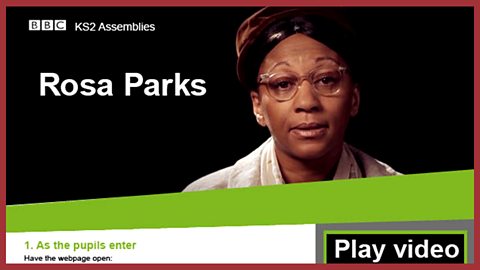
Rosa Parks slideshow. image
The slideshow is an integral part of the assembly.
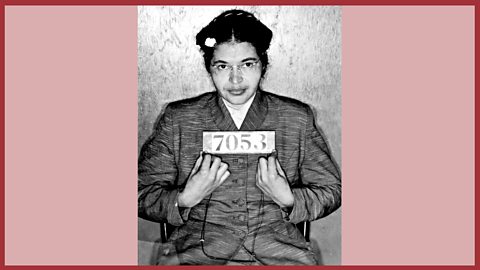
Margaret Bonds - March and Dawn from Montgomery Variations
Get to know two variations from Margaret Bond's 'Montgomery Variations', inspired by Rosa Parks and the Montgomery bus boycott that became a catalyst in the American civil rights movement.
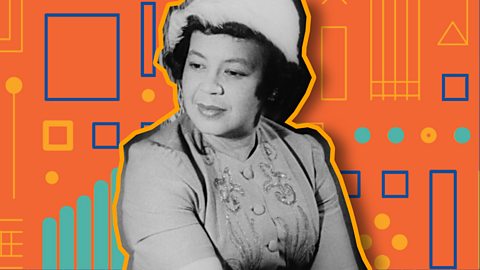

Suggested framework
1. Entry music
Play your chosen music. You might consider 'We shall overcome' or music from the Southern States of America or a blues track. Display the first image from the slideshow (see 'Key links' above).
2. Introduction
The assembly takes the form of a slideshow with text, with a pause after Image 6 to play the video clip. The suggested text is as follows:
- Image 1: America in the 1950s… A land of great wealth…opportunity…freedom… But not for everyone. Because black people living in America at that time were often treated very differently to white people. In many parts of America they were kept apart – they were segregated. Black people couldn’t go to the same schools as white people…
- Image 2: Couldn’t sit in the same cinemas…
- Image 3: Couldn’t drink from the same water fountains…
- Image 4: Couldn’t even sit in the same place on a bus…
- Image 5: Many people - both black and white - knew that segregation wasn’t fair and they protested about it…but little changed.
- Image 6: Then, one day in 1955, a woman called Rosa Parks boarded a bus after work, in a city called Montgomery. What you’ll see now is an actress being Rosa, to tell us what happened on that extraordinary bus journey…
3. The video
At this point you have the option to pause the slideshow to play the video. The duration is 3' 19" and the final words are: '…just didn't know what to do about it.'
4. After the video
Continue with the final images of the slideshow. The suggested text is as follows:
- Image 7: Rosa Parks was arrested for not giving up her seat on the bus - and charged with breaking the law.
- Image 8: But people came to her support - first in Montgomery where she lived…and then all over America. Marches were organised to protest against segregation…marches that grew in to what became known as the Civil Rights Movement - a movement that demanded the same rights for all people.
- Image 9: Rosa Parks became an important figurehead of that movement…because her simple act of defiance inspired others to take a stand against unfairness as well.
- Image 10: The world is a very different place today…but there are still many things that are unfair. If you experience unfairness and wonder what to do, perhaps you - like many others - will remember the story of Rosa Parks and a famous bus journey made long ago…
5. Time to talkAfter the slideshow you could use the video questions to aid recall of the events. Pupils could turn to a partner to discuss what strikes them as extraordinary about Rosa Parks' story; what words would they use to describe her and her actions; what do they feel we can all learn from Rosa Parks' story?
6. Opportunity to sing
If your assembly is to include a song this would be a good time to include it. Suggestions from 91»»±¨ collections below.
7. Opportunity for reflection
We’ve heard today about an extraordinary woman - Rosa Parks.
Rosa Parks didn’t know that the 1st of December 1955 was going to be different to any other day…but on that day she decided the time had come…the time to take a stand against the unfairness that she saw around her…
Think about a time when you’ve experienced things that seem unfair…
How did you feel and what did you do…?
Did you have the courage to say anything…?
Sometimes it can be difficult to speak out against unfairness…but sometimes all it takes is a single courageous voice to begin to put things right again…
8. Opportunity for prayerUse your usual form of address ('Dear God', 'Lord Jesus' etc) and:
Thank you for those people, like Rosa Parks, who have the courage to take a stand.
Help each of us to take a stand when we see things around us that are unfair…
So that together we can work for a better world.

Suggested songs
Song: 'You've got to move'. Come and Praise, no 107. Vocal version.
You’ve got to move when the Spirit says move,
You’ve got to move when the Spirit says move,
‘Cos when the Spirit says move,
You’ve got to move when the Spirit,
Move when the Spirit says move.You’ve got to sing when the Spirit says sing,
You’ve got to sing when the Spirit says sing,
‘Cos when the Spirit says sing,
You’ve got to sing when the Spirit,
Sing when the Spirit says sing.You’ve got to clap when the Spirit says clap,
You’ve got to clap when the Spirit says clap,
‘Cos when the Spirit says clap,
You’ve got to clap when the Spirit,
Clap when the Spirit says clap.You’ve got to shout when the Spirit says shout,
You’ve got to shout when the Spirit says shout,
‘Cos when the Spirit says shout,
You’ve got to shout when the Spirit,
Shout when the Spirit says shout.You’ve got to move when the Spirit says move,
You’ve got to move when the Spirit says move,
‘Cos when the Spirit says move,
You’ve got to move when the Spirit,
Move when the Spirit says move.
'Together' (All about our school, no 13).
- Work together, not alone,
Gather round and share a problem.
Work together, hand in hand,
Gather round and work things out.
Chorus
‘Cos together, we can work it out together,
We can ride the stormy weather,
As long as we’re together we’re strong!
- There’s a setback, don’t despair,
Gather round and share your feelings.
Why just worry on your own?
Gather round and work things out.
Chorus
- If there’s trouble big or small,
Gather round and find an answer.
If you stumble there’s a friend,
Gather round and work things out.
Chorus
Song: 'Give me oil in my lamp' (Come and Praise, no 43. Vocal version)
- Give me oil in my lamp, keep me burning.
Give me oil in my lamp, I pray.
Give me oil in my lamp, keep me burning,
Keep me burning till the break of day.
ChorusSing hosanna, sing hosanna,
Sing hosanna to the King of Kings!
Sing hosanna, sing hosanna,
Sing hosanna to the King!
- Give me joy in my heart, keep me singing.
Give me joy in my heart, I pray.
Give me joy in my heart, keep me singing,
Keep me singing till the break of day.
Chorus
- Give me love in my heart, keep me serving.
Give me love in my heart, I pray.
Give me love in my heart, keep me serving,
Keep me serving till the break of day.
Chorus
- Give me peace in my heart, keep me resting.
Give me peace in my heart, I pray.
Give me peace in my heart, keep me resting,
Keep me resting till the break of day.
Chorus

Related links

Assembly frameworks on related themes
Dr Martin Luther King - 'Dream on' collection
Fairness; injustice; the rights of minorities; peaceful change; inspirational leaders.
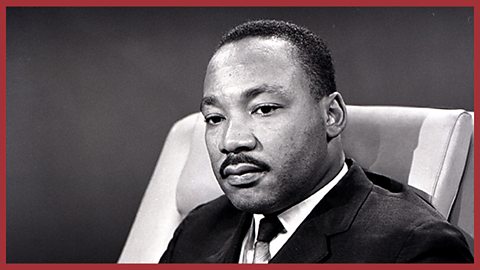
Mary Seacole. collection
Celebrating Mary Seacole; Black History; prejudice; determination; caring for others.
